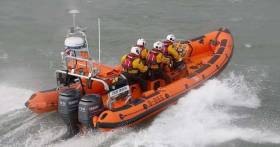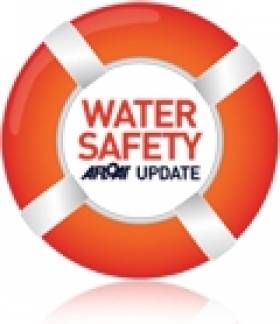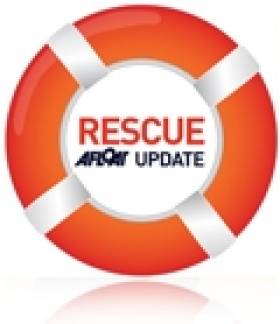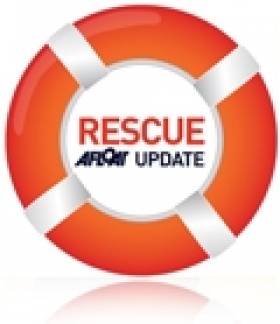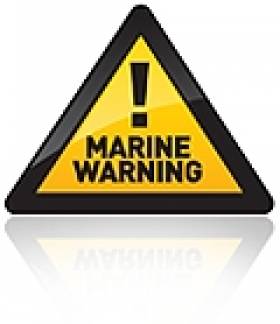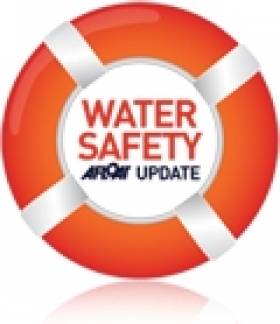Displaying items by tag: rip current
Omagh Man Rescued From Rip Current Runs Dublin Marathon in Bare Feet to Support RNLI
An Omagh man who was rescued by the Irish Coast Guard after he was caught in a rip current off a Donegal beach in July has completed the Dublin Marathon in his bare feet to raise awareness of water safety and to raise funds for the RNLI.
A seasoned open water swimmer, Chris Gallagher was visiting Murder Hole Beach when he got caught in a rip current.
“I am an experienced swimmer, having previously been a lifeguard and a world record swimmer as well as swimming all over the world including in Australia but I have never been caught like this before,” he said of his ordeal.
“I wasn’t even 10 metres out into the water when the ferocious rip caught me and threw me about like what I can only describe as being in an industrial washing machine and a racing car at the same time, it was powerful, and I had absolutely no control.
“I felt calm initially as I know how to work my way out of a rip curl as I was caught in Australian waters 22 years ago but nothing I tried worked.
“By the grace of God, a rock was in my grasp as I was being pulled into the rip roaring waters and I managed to get my body out of the water onto that wee rock but I was fighting the waves to stay on as they threw me on and off like a rag doll. I was clinging to the rock for dear life for two hours.”
Given the conditions, the Sligo-based coastguard helicopter Rescue 118 was tasked to the scene and rescued Gallagher from the water.
‘I am an experienced swimmer…but I have never been caught like this before’
Since he was rescued, Gallagher has signed up to be a water safety volunteer with the RNLI with a particular interest in highlighting the dangers of open water swimming.
He has also taken part in a series of inspiring fundraising events with his most recent venture to not only undertake the Dublin Marathon but to do it in his bare feet, which he completed successfully last Sunday (30 October). He also completed the Kerry Hardman Ironman triathlon on his birthday in August and in September a 5k swim of Glencar Lough in Sligo.
To round off his series of events, he is running an Eighties-themed night this Saturday 5 November in the Village Inn in Killyclogher. Proceeds from all events will go to Bundoran RNLI and Lough Erne’s two RNLI lifeboat stations, at Enniskillen and Carrybridge in Northern Ireland.
Speaking of Gallagher’s efforts to raise both funds and water safety awareness, RNLI community manager Nuala Muldoon said: “Chris really is an inspiration and his own rescue story highlights how even the most experienced water users can still find themselves in difficulty.
“We are delighted that he is now promoting water safety and are in awe at how adventurous he has been in setting himself courageous challenges in his pursuit to raise funds.
“Thanks to Chris, the proceeds raised will now power our lifesaving volunteer crews to continue their good work in saving lives both at sea and on inland waters.”
Skerries RNLI responded this afternoont to reports of swimmers in difficulty off a local swimming area known as The Springers.
The pagers sounded shortly before midday after Dublin Coast Guard received reports that a number of swimmers were caught in a rip current and were unable to get back to shore.
Skerries RNLI volunteers launched the lifeboat with David Knight at the Helm and crewed by Philip Ferguson, Emma Wilson and AJ Hughes.
Arriving on scene the crew discovered that there were four casualties in the water spread over a large area in between Red Island headland and Colt Island. The lifeboat quickly began recovering the casualties into the lifeboat.
With a large sea swell running and the casualties suffering from fatigue and early symptoms of hypothermia, it was necessary for one of the Skerries RNLI volunteers, Philip Ferguson to enter the water to assist them in getting on board.
Once all the casualties were on board the lifeboat returned to the station and recovered immediately to the warmth of the boathouse. Once inside the boathouse the casualties were assessed, monitored and treated for mild hypothermia but were all fit and well leaving the station.
Skerries Coast Guard unit and the Coast Guard helicopter Rescue 116 were also tasked. The helicopter stood by while the lifeboat recovered the casualties from the water.
Speaking after the call out, Gerry Canning, Volunteer Lifeboat Press Officer for Skerries RNLI said: ‘Rip currents are a major cause of accidental drowning on beaches across the world. Even if you know an area well, the currents may change based on the weather and tides. The speed of response is crucial in cases like this and our volunteers did an excellent job in getting there as safely and quickly as possible. ’
#WaterSafety - The Guardian reports on a remarkable evening for lifeguards on Cornwall's Polzeath beach yesterday (Tuesday 12 August) when 32 people had to be rescued from am "incredibly strong" rip current.
The seven bathers and 25 bodyboarders had reportedly fallen from a sand bank "straight into the path of the rip current" at the northern end of the beach, according to senior lifeguard Ben Miskowicz.
It took just over an hour for the six-member RNLI lifeguard team to get all 32 men, women and children to safety, rating the conditions on the beach at high tide as "too dangerous".
The Guardian has more on the story HERE.
Lifeguards Come To Seán Bán's Rescue in Coastal Drama
#Rescue - RTÉ's veteran voice of the Gaeltacht was rescued by beach lifeguards while swimming at Spanish Point in Co Clare earlier this week.
The Irish Independent reports that Seán Bán Breathnach was believed to be caught in a rip current while swimming at the popular seaside haunt on a break from broadcasting for Radio Na Gaeltachta in the area.
Speaking after, Breathnach put down the incident as "nothing really", saying he "wasn't out of my depth, I was just bobbing up and down".
Despite this, rip currents such as that he was caught in are never to be taken lightly - as last week's rescue of a family of six at Castlerock beach in Co Derry proves all too true.
And with the death toll from drownings around Ireland during this week's heatwave reaching five as of yesterday, the risks associated with the water are very real.
#Rescue - Castlerock RNLI lifeguards rescued a family of six after they got into difficulty on the town’s seaside beach in Co Derry yesterday (7 July).
Senior RNLI lifeguard Gordon Clark was patrolling busy Castlerock beach when at he noticed a person in the water waving for help a short distance to the right of the flagged zone on the beach around 5.30pm.
The family of six – including a man, woman and four children – were all on bodyboards when they got caught in what appeared to be a flash rip, a strong current running out to sea.
After radioing for assistance, Clark swiftly entered the sea with a rescue tube. He was quickly joined in the rescue operation by his RNLI lifeguard colleagues Jenny Thompson and Ray Cunningham.
Clark and Thompson proceeded to safely ferry the children, followed by their parents, to the shore, where they were checked over to ensure they hadn’t taken on any water. All were safe and well.
Speaking following the rescue, Mike Grocott, RNLI lifeguard manager for Northern Ireland, said: "Rip currents often catch people out because they can be difficult to spot, and research shows that most people don’t know how to identify one. They are a major cause of incidents that the RNLI’s lifeguards deal with each season.
"Anyone who gets caught in a rip should try to remain calm, raise their arm in the air to signal for help like the family member did today. If they feel they can swim, they should swim parallel to the beach until free of the current, and then head for shore."
With temperatures expected to soar this week, Grocott reminded people to be mindful of the RNLI’s key safety recommendations – choose a lifeguarded beach and swim between the red and yellow flags, which mark the safest area to swim and are an indicator that lifeguards are on duty.
Heat Wave Masks the Dangers of Cold Water & Rip Currents
Hot weather often lulls people into a false sense of security that will place lives at risk this weekend at beaches, rivers and lakes. Knowing the dangers will reduce the chance of water-related accidents and tragedies.
Rip-Currents - the tidal influence of a new moon on Saturday will cause stronger than normal rip currents this weekend. It will be the first outdoor swim of the year for many people unaware of the dangers of swimming in open water. To escape a rip current, never swim against this narrow current of water flowing away from a beach. Instead, swim parallel to shore, out of the narrow current, then swim back to shore.
Cold Water - contrary to the heat on shore, coastal water temperatures are only approximately 10° Celsius. Swimming may give the feeling of warmth but muscles cool quickly in cold water which may impair a person's ability to swim ashore. Inland waterways are cooler still.
Stranding - the tidal influence of a new moon on Saturday will expose greater areas of beach, increasing the risk that walkers will be stranded by a fast incoming tide.
Supervision - Children are curious about water therefore it is critical that adults supervise children at all times at beaches, inland waterways and farms.
Thousands of people will flock to our waterways so make sure you wear a Lifejacket fitted correctly and worn with a crotch strap.
Teen Surfers Honoured for Saving Boy from Drowning
#WATER SAFETY - Two teenage surfers have been honoured for their brave effort in rescuing a young boy from drowning earlier this year, The Irish Times reports.
Bernard Cahill, 17, and Donough Cronin, 16, from Ennis received Just in Time Awards at Irish Water Safety's annual awards ceremony in Dublin Castle on Tuesday.
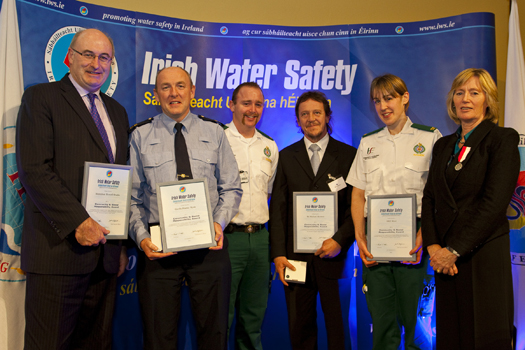
The duo were recognised for going to the aid of nine-year-old Gearóid Rogers, who was caught in a rip current near Spanish Point with his father Ger.
The Rogers family paid tribute to the surfing teens at the ceremony, with Ger saying he and his son were "lucky to be alive" thanks to their actions.



























